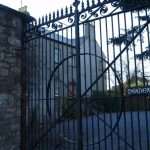Of course, the online edition is available any time and anywhere, but there are certain experiences that need to be tactile to be authentic, reading the ‘Church Times’ is one of them. The preference for reading it in hard copy means reading articles days after they were published. (It remains a source of mystery that postal delivery of the weekly edition of the paper in Northern Ireland is on a Friday morning, while in the Republic, where most addresses are closer to the publisher, the delayed transport and lack of a Saturday delivery cause it to be Monday morning before it comes through the letterbox).
Most of the news seems strange and alien to someone who has spent most of his life in Ireland, but there are still items that make worthwhile the annual subscription, not least Ronald Blythe’s weekly column, ‘Word from Wormingford’.
Hunched over a bowl of porridge, in a kitchen where the temperature at times struggles to reach double digits, Blythe’s description of a wintry East Anglia could be written in the chill of rural Leinster in December:
I take in the tender plants, take cuttings, take care not to over-water them, having scrubbed the rustic pots. One or two geraniums are in bloom; so they are given a last scarlet show on the piano. The central heating in the sitting-room has been turned off, and I am surprised that they don’t freeze. The pictures stare coldly from their icy frames. I fetch the winter curtains from the cleaners. What else? Stay warm! I read Elizabeth Bowen’s stories. Old friends for December. And thank God that you have not inherited an Irish country house.
‘Thank God’, indeed.
The deanery in Kilkenny, the required residence for my wife, must be the coldest house in the Thirty-Two Counties. A century ago, five staff lived in the basement servant quarters, while the chauffeur and his family lived in the coach house. There was even a gardener’s cottage in the garden. Perhaps the house was warm in those times, with a maid stoking the numerous fires, but it seems unlikely.
Originally built in 1614 and rebuilt in 1755, the house has residents who cannot afford to heat it and, even if the parish were inclined to spend thousands on oil, one would have to ask whether such expenditure would be appropriate. Even the prospect of double glazing was blocked by the guardians of the national heritage, who insist that the house must retain its original features, while living themselves in warm and comfortable modern residences.
Should Ronald Blythe ever wish to capture a sense how cold were the days of Elizabeth Bowen, he would be welcome to stay in Kilkenny.
